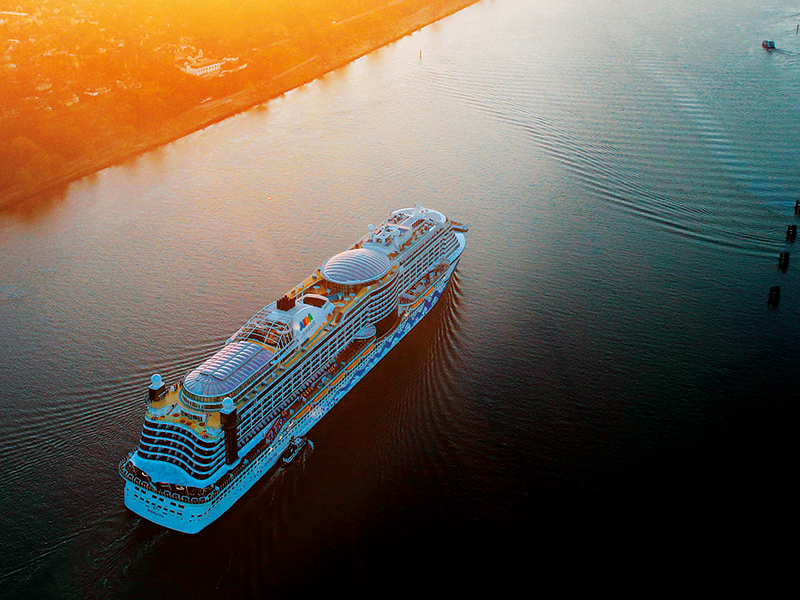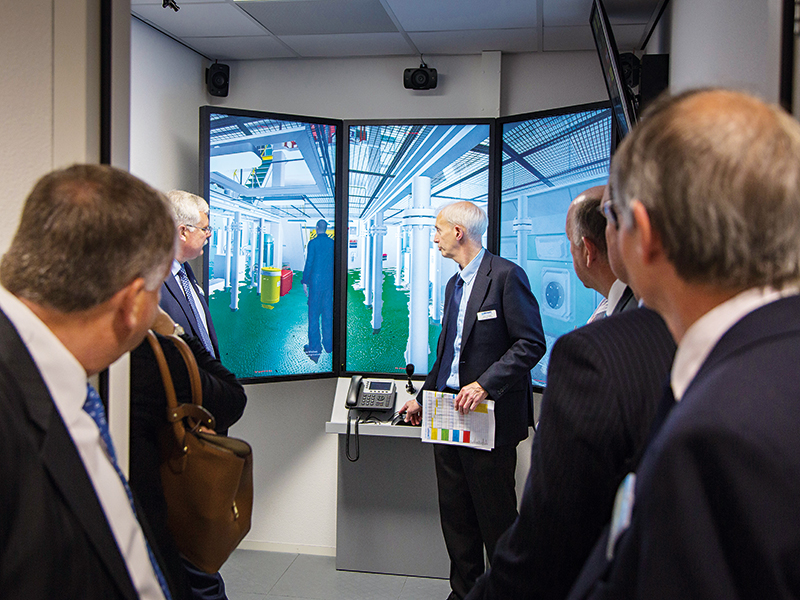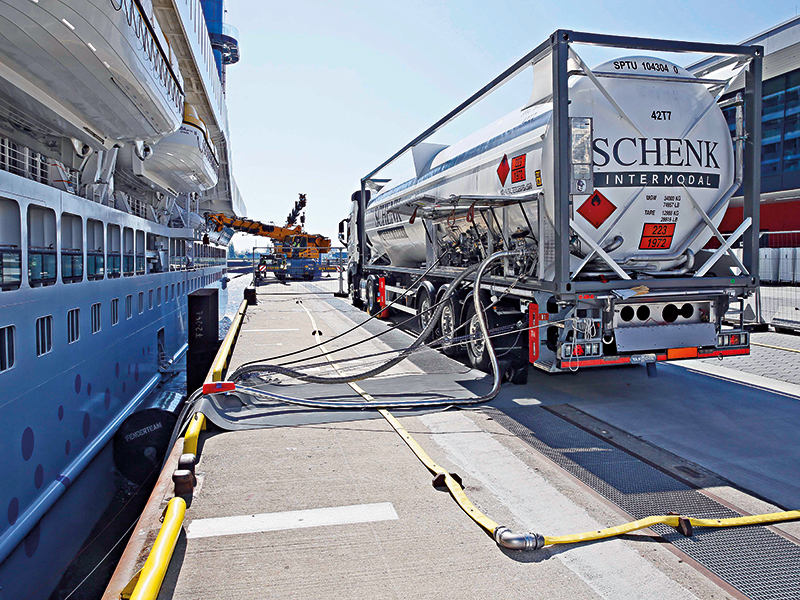Carnival Corporation sets course for a more sustainable future
At a time when companies across all sectors are coming under scrutiny for their impact on the environment, the cruise industry is setting sail for an even more sustainable future

Carnival Corporation continues to strive for environmental and social sustainability across its 10 brands
The word ‘sustainability’ has come to prominence in the past decade, with the term’s ubiquity among modern businesses making it a staple of our daily routine. The mounting desire to reduce our negative impact on the planet has placed sustainability at the forefront of customers’ minds and, in turn, their expectations. As such, the push to adopt sustainable practices now transcends the boundaries of industry – and travel is no exception.
“When our guests sail with us, it’s their expectation that we operate using highly sustainable business practices,” said John Haeflinger, Vice President of Maritime Policy and Analysis at Carnival Corporation, the world’s biggest leisure travel company. “Awareness of sustainability issues has been growing steadily for the past several years, especially in many of our key markets, and we remain committed to making positive strides in our sustainability practices around the world. But, more importantly, the sea is where we live and work, so it’s in our best interests to protect the marine environment.”
What’s more, with today’s cruisers and vacationers more eco-conscious than ever before, there’s a call for greater openness regarding the potential environmental and social impacts of companies’ operations.
Clear waters
Carnival Corporation has a track record of transparency regarding its sustainability practices and performance. “We first disclosed our environmental performance statistics in 2005, and through the years we have evolved and expanded into releasing corporate, as well as brand specific, sustainability reports,” said Elaine Heldewier, Sustainability Director at Carnival Corporation.
“Our sustainability reports follow the Global Reporting Initiative guidance,” Heldewier told The New Economy. “We are firm believers in the importance of being open about our operational performance with all stakeholders, whether that be the public at large, shareholders, environmental NGOs or investment groups focusing on sustainability. Over the past 10 years, it has been interesting to see the focus move to factors beyond the financial performance of a company. Today, sustainability is not a cost of doing business: it’s a way of doing business.”
In a bid to improve the company’s transparency regarding environmental impact, Carnival Corporation began publicly disclosing its carbon footprint in 2006 via the Carbon Disclosure Project (CDP). “Since having our data independently verified by the CDP, we have made significant progress mitigating the carbon impact our growing fleet has on the environment,” said Karina Spiegel, Sustainability Manager at Carnival Corporation.
The mounting desire to reduce our negative impact on the planet has placed sustainability at the forefront of customers’ minds and, in turn, their expectations
In 2015, the company established 10 sustainability goals in an effort to reduce its environmental footprint, while also enhancing the health, safety and security of its guests and crew. “Prior to aligning around our 2020 Sustainability Goals, we had one publicly stated aim, along with multiple internal goals,” Haeflinger said.
“In 2015, we felt it was the right time to make these known to the public, so we spent several months in an open dialogue with our management teams across all of our brands to align on goals that would deliver the most positive impact and be in line with our business strategy. These goals also served as an indication of our deep commitment to the environment, our guests, our employees and the communities in which we operate.”
Along with the other members of the Cruise Line International Association (CLIA), Carnival Corporation has formally adopted the Passenger Bill of Rights, which codifies the longstanding practices of CLIA members to further inform cruise guests of the industry’s commitment to their comfort and care.
Sustainability has always been a core value at Carnival Corporation, and the company’s efforts have become even more focused since Arnold Donald took the helm in 2013. But Donald’s influence doesn’t end with the 10 brands currently operating under Carnival Corporation’s umbrella; it also stretches across the entire industry, which benefits from Donald’s role as CLIA Chairman.
Life at sea
Travelling on a cruise ship for long stretches of time can be difficult for staff. It’s vital, therefore, that cruise companies make their vessels as comfortable as possible, and ensure they help alleviate the stresses associated with being away from one’s family and friends for long periods of time.
“Based on the feedback given to us by our crew members, we know that internet connectivity is a top priority across all of our brands, with staff wanting to stay in close contact with family and loved ones,” Haeflinger said. “While at sea, internet access is currently delivered through satellite connections. We continue to invest heavily in this area for our crew, as well as our guests.”
Always striving to create a positive working environment for its employees, Carnival Corporation has created a number of forward-thinking programmes that offer unique opportunities for professional and personal growth. As a result, the company has cultivated a strong sense of loyalty among its employees, which has also provided continuity. “Our brand teams make every effort to create a positive, caring work and living environment where everyone feels valued and respected,” Haeflinger told The New Economy.

Crew-only facilities on board help make ships a home away from home, giving staff respite from the hustle and bustle of the ship. Such areas include dining halls that accommodate various dietary needs, special areas where crew members can relax and enjoy views of the ocean and ports of call, a gym to stay in shape, a lounge with games and computers, and other places for socialising.
In addition to these day-to-day comforts, Carnival Corporation believes it is imperative that diversity and workplace equality are enforced. “At Carnival Corporation, we have created an environment where the input of our employees is heard and respected at all levels of the organisation,” Haeflinger said. “It’s a standard operating procedure for us, and it has a positive ongoing impact on the success of our business.
“We are a diverse organisation, one which values and supports our talented employee base. We are committed to being an equal opportunity employer, employing people from around the world and hiring individuals based on the quality of their experience, skills, education and character, without regard for their gender or identification with any particular group or classification of people.”
To help drive diversity and inclusion further, Carnival Corporation has partnered with several organisations, such as the Hispanic Association on Corporate Responsibility, whose mission is to advance the inclusion of Hispanics in corporate America, and the Human Rights Campaign (HRC), the largest LGBTQ civil rights organisation in the US. In recognition of its diverse workforce, HRC has ranked Carnival Corporation among the top companies for LGBTQ equality for the past three years. “We were also recognised by Black Enterprise magazine as one of the 50 best companies for diversity,” Haeflinger added.
Women on board
Gender equality is another area Carnival Corporation has addressed in order to help promote a diverse and balanced workforce. Historically, women have been under-represented in cruising. However, in 2010, Inger Klein Thorhauge and Sarah Breton made history, becoming Carnival Corporation’s first female captains while working under the Cunard and P&O Cruises (UK) brands, respectively. Heldewier said: “Although Thorhauge and Breton are our first female captains, they are not the only females to climb the ranks within our organisation. In fact, our brands have female officers at various ranks.
“Supporting and promoting women in the industry starts with positioning accomplished women on our board and on our leadership team. One such example is Christine Duffy, who was hired to lead Carnival Cruise Line. Christine is a dynamic leader with more than 30 years of experience in the travel industry. She started as a travel agent in Philadelphia, and has since become Carnival Cruise Line’s first female president, leading the globalisation of cruise industry associations around the world.
Carnival Corporation has created a number of forward-thinking programmes that offer unique opportunities for professional and personal growth
“Christine is an advocate for female leadership in business and founded the Women’s Leadership Initiative. She has also been ranked as one of the Top 10 Women Leaders in the Meetings Industry and named among the 25 Most Influential People in the Meetings Industry four times.”
Others include Ann Sherry, who was promoted to the post of CEO at Carnival Australia, and Julia Brown, who was appointed to lead the company’s global procurement practice in a newly created position. “Julia’s extensive experience leading procurement at companies with massive global operations will help us partner more closely with our suppliers, strengthening our sustainability performance,” Heldewier said. “Julia has been named as one of the Top 100 Most Influential Blacks in Corporate America, and has also been featured on lists such as the 100 Women to Watch and 75 Most Powerful Women in Business.”
Carnival Corporation has also partnered with Catalyst, a leading non-profit organisation dedicated to creating inclusive workplaces where anyone, regardless of social background, can thrive. “Our employees are the heart of our operation,” Spiegel said. “A key element to our success is our drive to create opportunities for employees to expand their knowledge and excel in their performance. We do this by providing avenues through which they can learn and grow in their career path.”
For example, Carnival Corporation opened the Arison Maritime Centre in 2016, providing a new home for the Centre for Simulator Maritime Training Academy (CSMART Academy). This world-class facility – equipped with the latest technology and equipment – provides rigorous safety training to bridge, engineering and environmental officers responsible for the navigation and operation of the world’s largest fleet of cruise ships. Spiegel said: “CSMART Academy participants receive a maritime training experience that fosters critical thinking, problem solving, ethical decision-making and skill development. We expect to train over 6,500 bridge, engineering and environmental officers at the academy every year.”

All hands on tech
Carnival Corporation consistently strives to incorporate the very latest advances in technology to lower its carbon footprint and reduce its impact on the sea and local environment. “Part of our sustainability strategy is focused on continuous improvement,” Haeflinger said. By adopting this approach, Carnival Corporation has become a pioneer in the industry. The group was the first cruise company to develop and deploy a number of technological solutions, including exhaust gas cleaning systems and the use of liquefied natural gas (LNG) in port to power its ships.
Exhaust gas cleaning systems, which reduce the emission of sulphur and particulate matter, are now deployed in 60 Carnival Corporation ships – a figure that expands with each passing year. Through adopting this technology, the company has prompted others in the industry to follow suit, with numerous cruise companies now installing exhaust gas cleaning systems. A similar domino effect is expected with LNG as well.
In line with its continued commitment to addressing carbon emissions and improving air quality, Carnival Corporation has implemented a new ship programme focused on delivering both energy and greenhouse gas-efficient ships by leveraging cutting-edge technology and lower-carbon fuel sources. Consequently, Carnival Corporation is now in the process of building seven fully LNG-powered cruise ships. This is a particularly important part of the company’s strategy, as LNG doesn’t emit sulphur dioxide and, when compared to marine diesel oil, has a 95 to 100 percent reduction in particulate matter, an 85 percent reduction in nitrogen oxides and a 25 percent reduction in carbon emissions.
Spiegel said: “AIDAsol, from our German-based AIDA Cruises brand, became the first cruise ship in the world to be supplied with power via an LNG hybrid barge while in port. The barge was designed, constructed and commissioned in three years, as part of a unique pilot project we developed with Becker Marine Systems. Currently, we have seven new LNG cruise ships on order. These new vessels will be part of the first generation of cruise ships to be fully powered by LNG.”
Carnival Corporation consistently strives to incorporate the very latest advances in technology to reduce its impact on the sea and local environment
Pioneering a new era in the use of low-carbon fuels, these new ships will use LNG to generate 100 percent of their power both in port and on the open sea – an innovation that will significantly reduce exhaust emissions, helping to protect the environment and support Carnival Corporation’s sustainability goals. These seven ships will be delivered between 2018 and 2022. “Since fuel represents more than 97 percent of our direct and indirect carbon emissions, we are also partnering with one of our engine manufacturers to continue to improve our fuel efficiency and, in turn, reduce our fuel consumption,” Spiegel said.
Another breakthrough technology is Carnival Corporation’s Ocean Medallion, a digital concierge service that provides guests with a highly personalised experience via personal devices and display screens located throughout the ship, as well as a medallion that can be worn or carried. With this technology, passengers can create personal profiles before embarking on their journey, providing a variety of details such as their entertainment preferences and dietary requirements to ensure a seamless experience while on board.
Ocean Medallion also alerts guests to activities they may be interested in, locates travel buddies on the ship and allows guests to order food before they walk into a restaurant. Set to be introduced with Princess Cruises in November, Ocean Medallion has tremendous potential to change the way the cruise industry – and possibly even other industries – approaches hospitality.
Code of conduct
While on-board hospitality continues to evolve with the introduction of new technologies, so do the ships themselves. Carnival Corporation is working to adopt more exhaust gas cleaning systems and integrate a greater number of LNG-powered ships into its fleet. In the meantime, the company is continuously improving its transparency by expanding its number of sustainability-based key performance indicators and deepening the level of reporting it undertakes.
“We are building on our commitment to sustainability by extending our code of conduct to our business partners, ensuring all suppliers adhere to sustainable practices in areas such as labour, human rights, health, safety, security and environmental protection,” Haeflinger said. “This is essential to the cultivation of healthy societies around the world.”
With such efforts in tow, Carnival Corporation continues to lead the industry in terms of not only size, but also sustainability, setting industry-wide standards for managing its valued resources: its staff, its guests, the environment, and the communities in which they live and visit.













